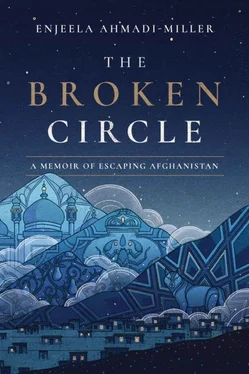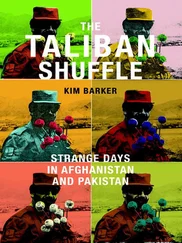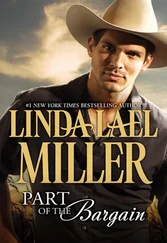Every time I lay down to sleep, I let my thoughts drift to the man with the white horse and his words of comfort to me. He had followed me from house to house, and I would float away with him into a land of peace and beauty. I began to think that maybe there was a reason to hope. He said I was special, so it must be true. I must have some peculiar gift since I was the only one who could see him. Through the cold days and shivering nights, I knew I hadn’t imagined him. He was as real as the war to me.
Spring arrived, and my aunt and my cousin Izmarai, son of my Aunt Gul, came to stay with us. He was a slender, handsome boy, with blond hair, green eyes, and an infectious smile. Izmarai felt like one of us, fitting into the family as a brother. We were close to the same age, so we played together. Our house was small, and now, not by choice but out of necessity, the kids all slept in the same room. Playing cards and games continued to be the way we would spend our days and nights. We were not allowed to go outside, but I knew the spring flowers and ashoka trees were blossoming, and soon it would be summer. Whenever the door opened, the fresh smell of spring filled our small house. The air was changing.
One morning, way before dawn, Padar woke us.
“Everyone up. Get dressed,” he commanded.
Zia groaned, “Not another poetry session,” but this morning’s arousal was different. Padar was dressed neatly. His hair was combed, and he didn’t sound like he had been drinking. His voice was serious and sober. This was not a midnight poetry session. He held the lantern close to each of our faces and told us to wake up. In his other hand, he held four backpacks.
“Pack a change of clothes in these,” he said, dropping a backpack by each of us. “Get up and hurry.”
My aunt came into the room and helped us.
“Hurry, children,” she said in a calm voice. “Pack quickly.”
She sorted through our things and picked out clothes we should take. She worked methodically. She knew exactly what we would need. All of our pretty dresses and city clothes we were to leave behind. She said we were to travel, so we shouldn’t pack too much. We had to hurry because we must leave soon.
“Remember, always dress properly, not like you’re going out to eat or shop in Kabul, but comfortably.”
None of us asked any questions. Maybe we were too tired and shocked in that moment. There had been so much change in our lives the last two years. And almost everyone we knew had already escaped the country. Another move didn’t seem odd. Once we were packed, Padar called us to come into the small hall by the door. We gathered around the lantern. By the door stood a big man. He was dressed in traditional clothes, peran tumban , and a flowing cape that covered him like a country peasant. He did not carry himself like a peasant, though. He stood erect and had an ease about him. Even under those baggy clothes, his muscles and wide shoulders were obvious. He had long, black, curly hair that rushed down over his shoulders. He possessed a disarming smile and a very handsome and brave-looking face.
“This is Masood,” Padar said. “He’s going to take you out of Kabul.”
Izmarai stood off in the dark next to his mother.
“Is Izmarai going with us?” I asked.
“No, Enjeela,” he said. “He can’t.”
I begged Padar to let our cousin come with us, until he grew exasperated with me.
“Enough, Enjeela,” he said. “You have to leave now.” He gave each of us money. None of us counted it, but it seemed like a lot. We stuffed it in our backpacks or our shoes. I saw him give Laila a piece of paper with the name of a hotel on it.
“I won’t be going with you right now.”
“What?” Laila said. “We’re going alone?”
“I can’t leave yet. The Russians follow me everywhere. If I’m with you, we’ll all be arrested.”
Laila started to argue, but he raised his hand to signal silence. He had made up his mind.
“This man will take care of you. Don’t worry.” He motioned toward Masood.
Laila had a sullen glare. Zulaikha shrank back. Zia gaped. I cried. Now, like Ahmad Shah, it was our turn to slip away in the night.
Masood moved out of the shadows. He knelt by me and took my hand so gently, the way a man of great strength would do.
“Little one, are you afraid?” His eyes were clear and steely black. His smile was pure confidence.
I nodded.
“Don’t be.” His reassuring eyes blazed at me. “I am Masood. I will take care of you better than I will take care of myself. Nothing will happen to you unless it happens to me.”
In that instant, I trusted him. I wiped my tears on my chador .
He then went to each of my sisters and Zia, knelt by them, and told them the same thing. It was settled that we were to go with him. There was nothing more to argue about with Padar. Masood had a real strength to him that was unmistakable.
“This is a man you can trust. He will take you to Peshawar,” Padar said. “Do everything he says. You must go now.”
I took a breath.
Padar pushed us along. “I will see you all in Peshawar soon. Now go!”
We filed out the door. I hid my hair under a chador and dried my tears on the edges of the cloth. My sisters wore chadors that covered their entire bodies, and Zia was dressed like Masood. We all wore our newest sneakers. Masood took my hand, Padar closed the door to the house behind us, and we walked into the darkness of the sleeping city.
We had piled into a cab, which rode quietly through the dark, early-morning streets of Kabul and turned onto the highway taking us to Jalalabad. The four of us were crammed into the back seat.
The steely-eyed man, whom Padar said we could trust, sat in the front seat telling the driver which way to go. Peshawar, which is right across the border in Pakistan, was only a six-hour drive from Kabul. I knew that because so many of the kids in my neighborhood and at school had fled to Peshawar. Stories floated around that they had escaped the country, driving all night to the border. It was the first stop before going on to other places. We would stop in Jalalabad, and in my child mind, I expected to make it to the hotel Padar had told Laila about by that night or at least by early morning. I knew this from my friends who said it wasn’t far to Peshawar by car, maybe a day’s drive at most. And Padar hadn’t said when he would come to us, but I felt certain he would come after us.
As dawn broke, we were well outside Kabul. The car stopped on a lonely stretch of road beside a bus. We had buses in the city, but this one was different. It looked like an old school bus, with bright-colored stripes painted along the sides. Prayer beads hung from the rearview mirror, and tassels decorated the windows. A stereo on the dashboard blared Indian music.
Masood urged us up and into the bus. The bus was crowded, but we found places to sit on the worn leather seats that were deeply cracked and torn. This wasn’t a bus full of city people. I’d never seen so many women in one place wearing the full-face-covering burkas. The men wore peran tumbans and turbans. Only a few of the younger men wore T-shirts and jeans. People stared at us. We were the only children among the passengers. I’d never felt so out of place, like a foreigner.
The bus motor rumbled, and we began rolling, the driver pushing it methodically through the gears as it lumbered up to speed. Outside my window, I watched as we moved farther away from the flat, arid land surrounding Kabul and deeper into rugged mountains toward the Kabul River Gorge. The two-lane road appeared to have been carved out of the side of the sheer rock. On one side of us, the mountain, craggy with sharply angled boulders that protruded from the earth, veered off toward the sky, so we were constantly in the shade. On the other side, the edge dropped off into a tumbling river. We careened one way, then another, as the bus weaved through winding curves, straining the motor as the road rose and then descended so often I couldn’t tell if we were going up or down.
Читать дальше













